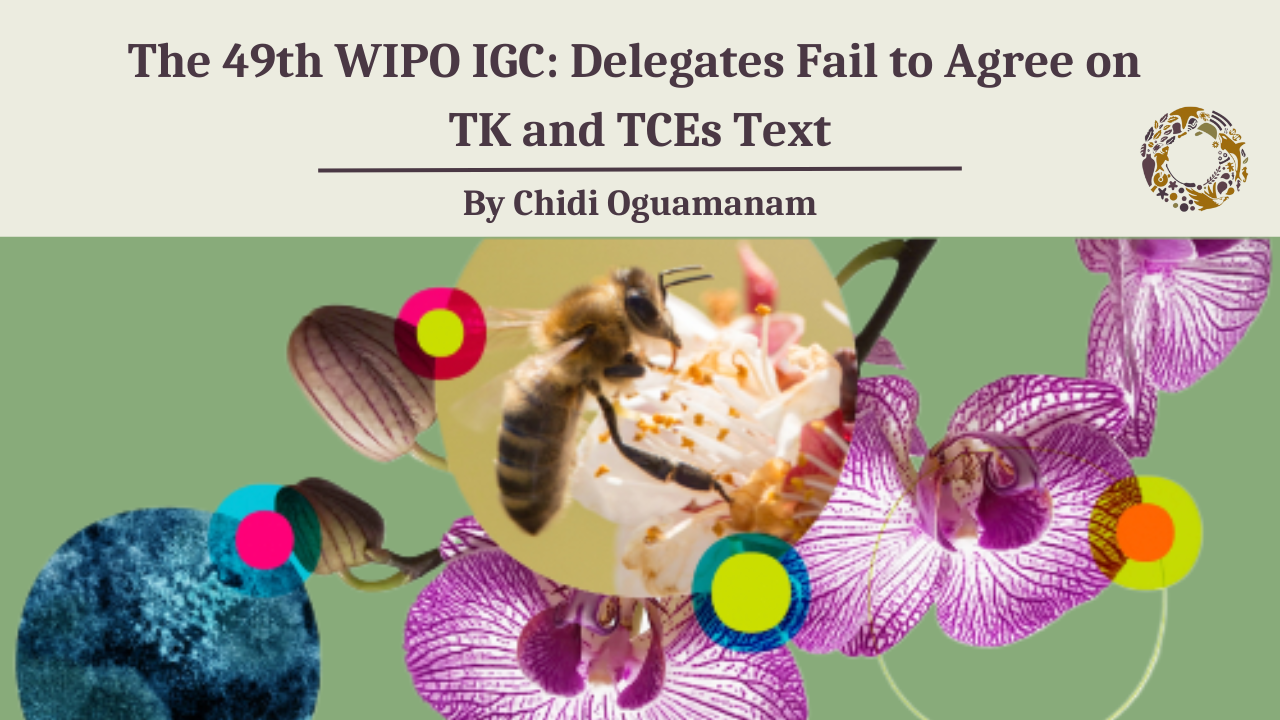The 49th WIPO IGC: Delegates Fail to Agree on TK and TCEs Text
No Momentum from the Traditional Knowledge and Design Law Treaties
In the aftermath of the November 2024 Design Law Treaty and the May 2024 Diplomatic Conference that delivered the first IGC Treaty on Intellectual Property, Genetic Resources and Associated Traditional Knowledge (GR-ATK), delegates failed to leverage the momentum created by the two new treaties. Negotiations resumed on December 2, 2024 and ended on December 6, 2024 under the Finnish Chair, Anna Vuopala, continuing from the consolidated documents WIPO/GRTKF/IC/47/4 (Traditional Knowledge) and WIPO/GRTKF/IC/47 (Traditional Cultural Expressions) from the 47th IGC Session.
A Mandate Ignored
The mandate of this IGC was very clear. In sum, the Committee was charged with identifying unresolved and cross-cutting issues with a view to narrowing existing gaps from previous negotiations and considering options for a draft of legal instrument(s) on the two subject matters, Traditional Knowledge and Traditional Cultural Expressions. The two texts referenced above reflect a consolidation of multiple perspectives from their preamble to the last Articles on TK and TCEs. The facilitators at the 47th IGC had managed to navigate and streamline highly contested issues, welding them into the two consolidated texts which the Committee succeeded in adopting. From the two texts, there is an emerging convergence of interests around the facilitators’ alternative texts across most of the proposed articles amidst multiple competing alternatives. In some instances, there are more than three competing alternatives in some articles. But the facilitators’ alternatives were preferred as they rallied many delegates across multiple regional negotiation blocs.
The most recent past IGC Chair, Jamaican Chair Lilyclaire Bellamy, had foreseen how herculean it appeared for delegates to close gaps on those alternative-ridden documents. She was proactive in drawing inspiration from the GR-ATK experience. In the latter, Australian Chair Ian Goss’ Text (Chair’s Text) became the working text that propelled delegates to the Diplomatic Conference on the GR-ATK treaty. Bellamy raised a non-paper Chair’s TK/TCEs Text (Zero Draft Nov 2022), which she later revised and released as non-paper Chair’s Text in May 2023. That was a brave attempt to consolidate TK and TCEs texts into one simple and seamless document. It also reflected a significant step on the question of “options for a draft legal instrument(s)”, which delegations have failed to tackle for over a decade and a half.
A Fraught Methodology Capitalized on by the Unwilling
With a combination of a fraught methodology and the inclination of some members to capitalize on it, the 49th IGC ended in a stalemate. Rather than focus on the session’s clear mandate, segments of delegates went into overdrive drafting without any guardrails while juxtaposing the two documents during the exercise. The only visible attempt to directly focus on narrowing gaps from previous negotiations was at a brief informal session that revisited the question of beneficiaries. Here, there was a clear divergence across the room. While some were inclined to limit beneficiaries exclusively to Indigenous Peoples and local communities, others pushed for inclusion of other beneficiaries in accordance with national law or specific national contexts. There was also an attempt to distinguish between beneficiaries of protection and beneficiaries of the instrument.
Due to the determination of some delegations to draft without set guardrails, the working documents had ballooned by the time the facilitators, Paul Kuruk (Ghana) and Aurelia Schulz (USA), released the Facilitators’ Rev. Document arising from the negotiations. More alternatives had emerged, existing alternatives had been diluted with additional texts, brackets had been inserted in new places and removed in others. The Chair’s attempt to persuade delegations that progress had been made and that the Committee has fulfilled its madidate was evidently wishful. Her proposal pursuant to her working methodology to invite the plenary “to take note of the [revised] versions [by the Facilitators] and transmit them to the 50th IGC for consideration” angered the Group of Like-Minded States (LMCs), the Africa Group and the Asia Pacific Group.
These groups were clear in voicing their displeasure over both the methodology and the result it delivered. Also, the Group of Latin American States, China, the Russian Federation and specific country delegations, including but not limited to Nigeria, South Africa, Kenya, Columbia, Mexico, Uganda, Egypt, Samoa, India, Brazil, Pakistan, Chile, Niger, and Jamaica additionally voiced their displeasure with the Rev. Document. They outrightly rejected the proposal to transmit the Rev. Document to the 50th IGC Session, which will be chaired by Brazilian Chair, Erika Watanabe Patriota. Only Group B and the Central European and Baltic States (CEBS) group were on record as supporting the transmission of the Facilitators Rev. Document to the 50th Session of the IGC.
Nothing Noted, Nothing Transmitted
Having failed to achieve a consensus on the key negotiation agenda mandate of the 49th IGC, and having turned down the Chair’s proposed decision, delegates spent the greater part of the last day haggling on an appropriate crafting of a decision or outcome document on the key agenda item. The African Group’s proposed decision text did not satisfy Group B and the CEBS. Collaborative efforts of delegates across regional blocs and specific Member States worked together to arrive at the following decision:
Decision on Agenda Item 5: Traditional Knowledge and Traditional Cultural Expressions:
The Committee worked on the basis of document WIPO/GRTKF/IC/49/4 and WIPO/TKGRF/IC/49/5. However, Member States were unable to reach consensus on the facilitators’ proposed texts and decided not to transmit those texts to the 50th Session of the IGC. Instead, the Committee decided to continue working on the basis of documents WIPO/GRTKF/IC/49/4 and WIPO/TKGRF/IC/49/5.
Furthermore, some Member States proposed that the 50th Session of the IGC should use the Chair’s text – WIPO/GRTKF/IC/47/Chair’s Text as a basis for negotiation, while Member States opposed.
50th IGC – Options Before the Delegations and Incoming Chair
The decision’s reference to the Chair’s Text reflects a division among delegates. An overwhelming majority of demandeur states see merit in the Bellamy Text. On the contrary, two blocs of non-demandeurs largely led by the United States as constituted in Group B and the CEBS group see no merit in the Chair’s Text. The incoming Chair of the 50th IGC has her work cut out for her. The options are clear; she would need to restore the goodwill of committed Member States to salvage the documents from the 47th IGC and reset negotiations. She could also expend her diplomatic skills to bring the USA/Group B and the CEBS Group to key into the emerging convergence of demandeurs around the Chair’s Text. Indeed, she can also invest some of her energy to work on the Chair’s Text, putting her own imprimatur on a new Chair’s Text, as risky as that may be. To succeed with that option, she would require extensive consultations. But there is no time for that under the remaining 2024-25 Biennium. Whatever she does, she may need to nudge delegates to address the issue of options for a draft international instrument(s); that is, whether to have a consolidated TK/TCE instrument or to keep the subject within a two-track negotiation. Bellamy’s Chair’s Text has demonstrated that it is possible to collapse the two into one.






